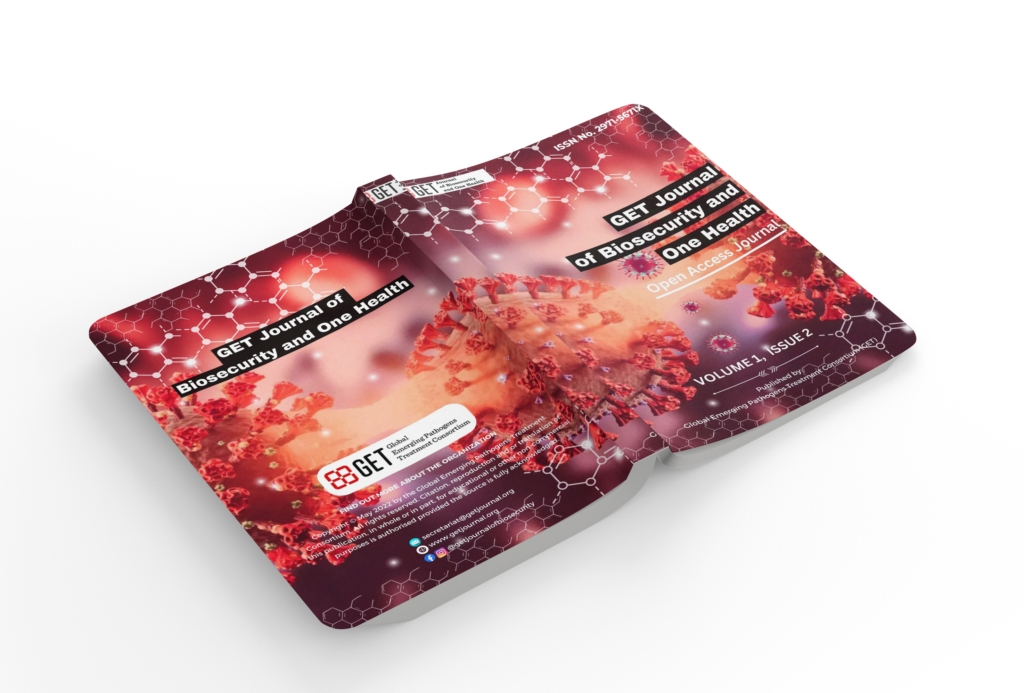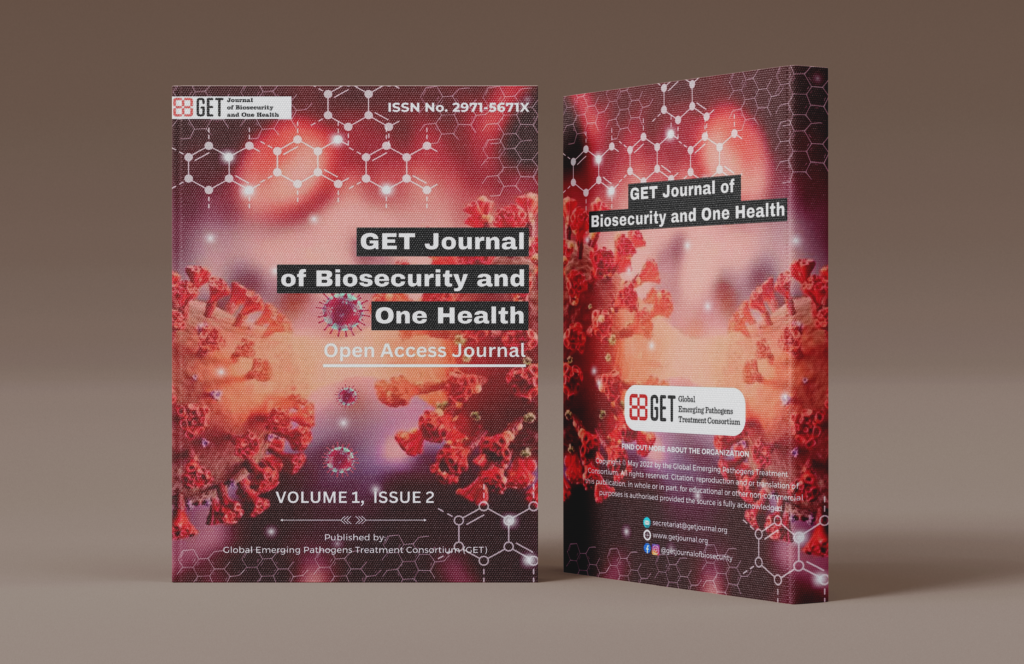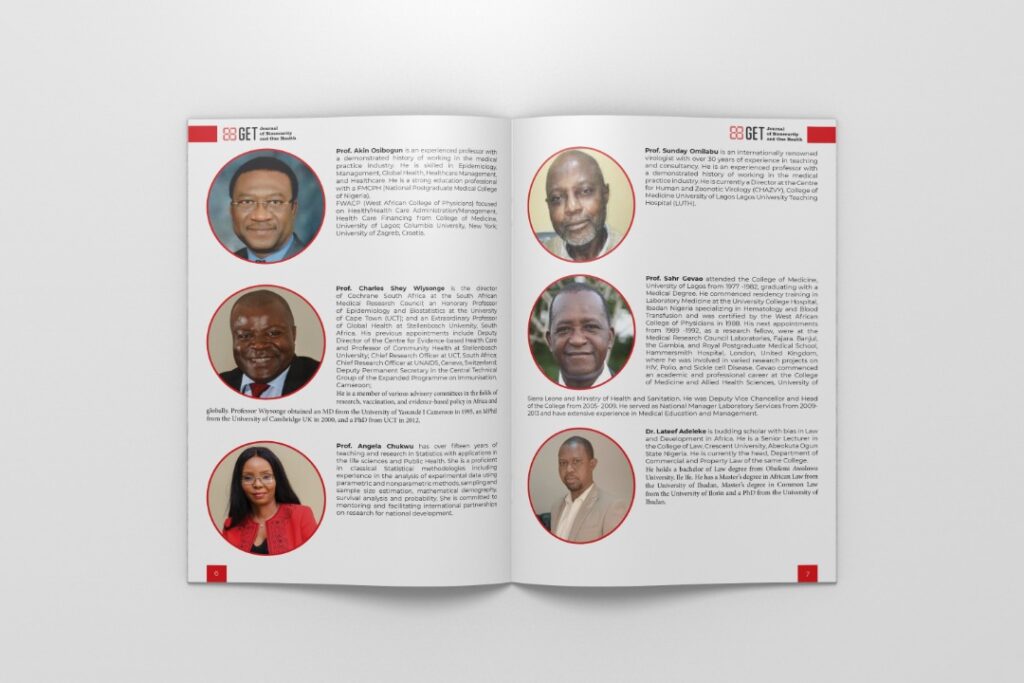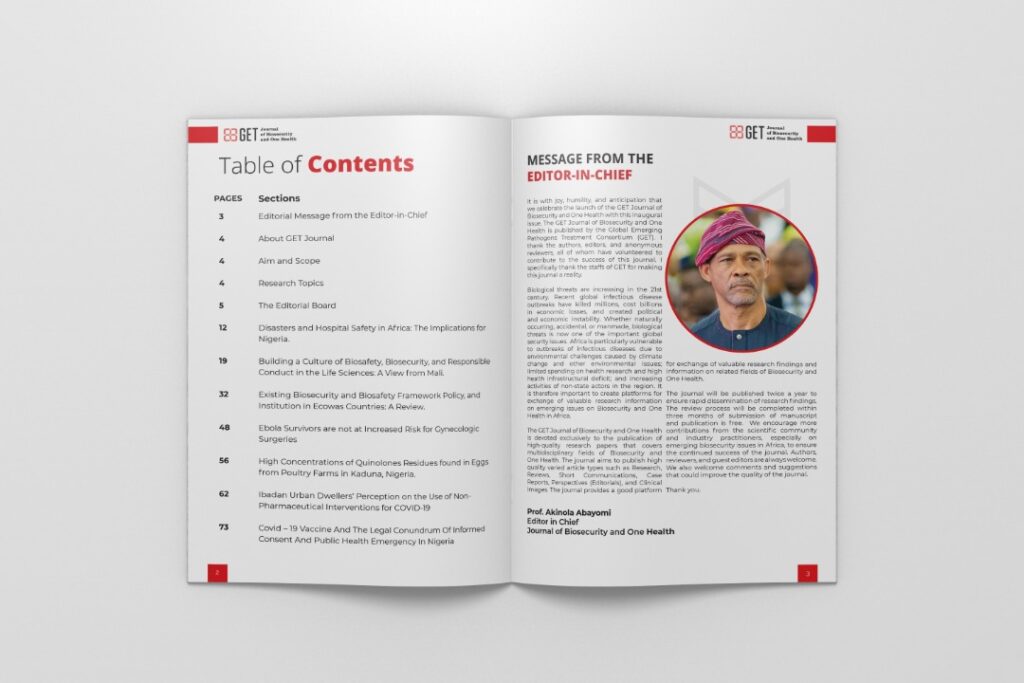GET Journal of Biosecurity and One Health
Volume 1 Issue 2
Authors: Sibley J1;Quellie SG1; Mendy PO1; Sayee DAN1;EastmanCB2; Stewart GK2; Reid EA2; Kennedy SB3*
GET Journal of Biosecurity and One Health, Volume 1, Issue 2, (2022), Pages 1-7
Article Keywords: Laboratory; Liberia; Quality Management System; Rural Hospital; Resource-Limited Setting
COVID-19 pandemic is a global public health emergency that has greatly impacted the health systems and people‟s lives worldwide. With its relatively high rate of infection and mortality, COVID-19 can worsen the feelings of anxiety and stress among Healthcare Workers (HCWs). The aim of this survey was to assess the prevalence of health workforce burnout during the COVID-19 response in Ethiopia. The study employed a health institution-based qualitative, cross-sectional survey with a structured design based on the validated tool MBI-HSS (Maslach Burnout Inventory Human Services Survey). In this study, we purposively selected 824 (74%) numbers of health care workers at the accessed health facilities from 1120 at the time of the survey and a response rate of 767 (93%). The English questionnaire was translated into two local languages (Amharic and Oromffa) and the data collector were selected from each region and city and then trained for 5 days. The study revealed that the magnitude of burnout was 70 % among HCWs working in COVID-19 response that participated in the study. The prevalence of burnout among the HCWs was 58%, 68%, and 64% for moderate to high burnout on Depersonalization, Personal Accomplishment, and on Emotional Exhaustion respectively. The prevalence of burnout among HCWs increased, particularly for those who were serving longer in all survey areas. The result of the study indicated the need to identify and eliminate burnout among HCWs in order to activate psychological resilience and guide workers in the use of the most effective long-term coping strategies to protect their mental health and align the design of intervention in all COVID-19 response areas.
Authors: Beasha SA*1, Nigussie Y2, Yohannes N2, Chala A2, Kassa D2, Assefa B1, Ayele A 1, Daba A 2, Hailu H 4, Lombamo F1, Tesfa A6 , Asrat F 7, Fantaye F 7, Habebe S 2, Assefa Z3, Abayneh A5
GET Journal of Biosecurity and One Health, Volume 1, Issue 2, (2022), Pages 8-17
Article Keywords: Burnout; COVID-19; Emotional Exhaustion; Depersonalization; Personal Accomplishment; Workforce.
Adherence to biosafety and biosecurity standards and practices by those involved in the life sciences is essential to protecting the health of humans, animals, and the environment. Fostering a culture of responsibility is one of the underlying tenets of the Biological Weapons Convention, the Global Health Security Agenda, Joint External Evaluation of International Health Regulations, and the Global Partnership Against the Spread of Weapons and Materials of Mass Destruction. It also underpins national and international efforts to protect science from misuse and to protect workers and the public from laboratory incidents. Unlike the nuclear domain, there is no available guidance or unified perspective on the nature of this culture or how it may be assessed. The International Working Group on Strengthening the Culture of Biosafety, Biosecurity, and Responsible Conduct in the Life Sciences developed a framework to assess organizational culture in biological laboratories based on the model developed by the International Atomic Energy Agency for nuclear facilities. This framework encompasses 1) management systems; 2) behavior of leadership and personnel; 3) principles for guiding decisions and behaviors; and 4) beliefs, opinions and attitudes. Here we present an example of how the beliefs, opinions, and attitudes element was employed to assess the organizational culture of laboratorians from five regions in Mali. This is the first assessment using the framework and, as such, provides a model for others seeking to improve biosafety and biosecurity, and may ultimately lead to international harmonization of this concept and provide a pathway to strengthen Mali’s laboratory system.
Authors: Bankole MA*1,2,5; Salu OB2,3,;James AB4; Olorunnisola BN1,5; Orenolu MR3; Anyanwu RA3; Abdullah MA3; Aladetuyi OO1,5; Mutiu BP1,5; Saka BA5; Babarere OO1; Dawodu R1; Abdus- Salam IA1; Idris J6 and Omilabu SA2,3
GET Journal of Biosecurity and One Health, Volume 1, Issue 2, December 2022, Pages 18-30
Article Keywords:Measles virus; Reverse Transcription Polymerase Chain Reaction (RT-PCR); Febrile Rash Illness.
Measles virus, an RNA virus of the genus Morbillivirus in the family Paramyxoviridae, is the etiological agent of measles disease, the fifth worldwide cause of death in children < 5 years of age. Despite the ongoing immunization progress in Nigeria, several sporadic cases and outbreaks of measles are still being reported annually, even among the immunized in the country. Continuous surveillance and early detection by laboratory diagnosis is of importance for early management of cases and prompt containment of community spread. Reverse Transcription Polymerase Chain Reaction (RT-PCR) testing was used for prompt diagnosis of all febrile rash illness (FRI) cases captured during routine disease surveillance activities in selected Health Facilities in Lagos State from 2016 to 2018. Whole blood or throat swab samples were collected and screened by RT-PCR from 140 consenting FRI patients accessing selected health facilities in Lagos State, Nigeria. Nine (6.4%) out of the 140 samples screened by RT-PCR were positive for Measles RNA. All the 9 measles positive cases were from children ages 1 – 5 years with females being more infected than males in ratio 3:1, although without any statistical significance (p= 0.7735). Out of eight Local Government Areas (LGAs) where FRI cases were sampled, only two of them (Eti-Osa and Lagos Mainland LGAs) account for the nine measles positive cases detected in this work. It is however a possibility that the number of LGAs with positive measles cases could have been more than two if all health facilities in the sampled LGAs were selected for the work, but within the limit of available resources, all health facilities could not be sampled.
Authors: Amoo SO¹, Tijani B², Onuigbo TI¹, Oraegbu JI¹*, Dorcas K², Agboola HA¹, Obi JC¹, Adeniji ET¹, Stephen K², Temi F², Ezike E², Akinreni T², Audu RA¹, Adegbola RA¹ and Salako BL¹
GET Journal of Biosecurity and One Health, Volume 1, Issue 2, December 2022, Pages 31-42
Article Keywords: COVID-19; COVID-19 Vaccine; COVID-19 Vaccine Attitude; COVID-19 Vaccine Acceptance; Camp Dwellers.
We assessed the awareness of COVID-19, COVID-19 vaccine, and willingness to be vaccinated among Nigerian camp dwellers. The study was a descriptive cross-sectional study. All National Youth Service Corps (NYSC) members and Officials in NYSC permanent orientation camp, Ikare Akoko, Ondo state, who gave consent, were enrolled in the study. A total of 848 participants were enrolled out of 1000 target population. Data were collected using an interviewer administered questionnaire. All data were analyzed using R 4.1.0. Chi-square tests were performed on statistically significant variables at p-values <0.05. The average age of the respondents was 26.05 years (SD=4.8). Further analysis showed that 88% (n=677) were aged between 20 to 29 years, with 50.1% (n=425) being male respondents. Sources of information about the COVID-19 vaccine varied, but the top three mentioned sources were radio/television (53.5%, n=454), social media (32%, n=271), and health workers (13.4%, n=114). Majority of the respondents (81.9%, n=675) were willing to accept COVID-19 vaccination, with slightly more than half (67.6%, n=554) responding affirmatively to pay not more than ₦200 (0.49 USD) for the vaccine. Interestingly, only 5.8% were willing to pay more than ₦2000 (more than 5 USD) to be vaccinated. A greater proportion of the respondents are willing to accept and pay for COVID-19 vaccine. However, it is recommended that more advocacy on the importance of COVID-19 vaccine should be carried out periodically. Also, COVID-19 vaccines should be readily available at little or no cost to ensure widespread uptake.
Authors: Bouagnon JJR1*, Diané KM1, Money M1, Cissé S1, Aka KAE1, Kintossou KA1, Coulibaly L1, N’Guessan F1, Grenier S1 , Djaman AJ2 and Dosso M2
GET Journal of Biosecurity and One Health, Volume 1, Issue 2, December 2022, Pages 43-52.
Article Keywords: Biobanking, High-Security Straws, System of Manual Sealing (SYMS), Semi-Automated Instrument (PACE), COVID-19 Pandemic.
The Pasteur Institute of Côte d’Ivoire in its mission of surveillance and support to public health participates in the response to the COVID-19 pandemic in Côte d’Ivoire. It is involved in the diagnosis by RT-PCR of SARS-CoV-2. Through its biological resource center, which is the regional biobank of ECOWAS, the Pasteur Institute of Côte d’Ivoire keeps a priori or a posteriori nasopharyngeal samples of the COVID-19 pandemic and associated data. This study aimed to characterize the key issues driving the straw CBSTM storage of COVID-19 pandemic nasopharyngeal specimens in Côte d’Ivoire, the key determinants of the process and the final storage protocol. Planning was used to examine the technical, economic, logistical, and political aspects of the project. The study was designed to include 100,000 samples from Abidjan, the economic capital, and the interior of the country. In the interior of the country, the samples came from COVID-19 centers in the interior cities. The biobanking process of nasopharyngeal samples in straw CBS TM or high security straws from a primary tube was carried out using two techniques: manual and semi-automatic. These straws are properly sealed with a guaranteed airtightness using the System of Manual Sealing (SYMS) and the semi-automated instrument (PACE) of the company CryoBioSystem (Saint Ouen sur Iton, France). The average monthly performance of the straws obtained is 1,685 for the manual technique versus 2,820 for the semi-automatic technique. This performance is in line with the objective set during the design of the study. The acquisition of the semi-automated technique (PACE) has allowed the biobank to reinforce biosafety measures concerning the handling of samples. In the event of a large-scale epidemic, the collection in a biobank requires a complete automated chain for stratification to facilitate the provision of samples to applicants and to strengthen the heritage collection.




Volume 1 Issue 1 Journals
- Ebola Survivors are not at risk for Gynecological Surgeries
- Existing Biosecurity and Biosafety Frameworks, Policies and Institutions in ECOWAS Countries: A Review
- Building a Culture of Biosafety, Biosecurity and Responsible Conduct in the Life Science: A View from Mali
- Disasters and Hospital Safety In Nigeria.
- High Concentrations of Quinolones Residues found in Eggs from Poultry Farms in Kaduna, Nigeria.
- Ibadan Urban Dwellers’ Perception on the Use of Non-Pharmaceutical Interventions for COVID-19.
- COVID-19 Vaccine and the Legal Conundrum of Informed Consent and Public Health Emergency in Nigeria.
